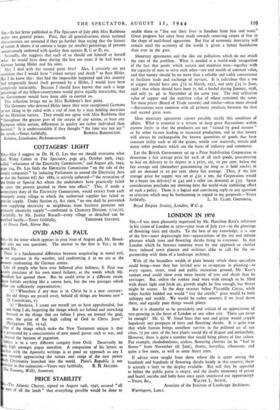OVID AND S. PAUL
15,—In the letter which appears in your issue of August 4th, Mr. Broad- asks me two questions. The answer to the first is Yes ; to the cone! No.
There is a fundamental difference between acquiescing in moral evil, we acquiesce in the weather, and confronting it as we are at the oment confronting the German armies.
Like all people who have ever followed after holiness, S. Paul was utely conscious of his own moral failures, as the words which Mr. roadholt has quoted show. But he could write in a different strain. pace forbids anything like a catena here, but the two passages which How are sufficiently representative: (I) "Wherefore if any man is in Christ he is a new creature: the old things are passed away, behold all things are become new" (II Corinthians, v).
(2) "Brethren, I count not myself yet to have apprehended, but one thing I do, forgetting the things which are behind and stretching forward to the things that are before I press on toward the goal, unto the prize of the high calling of God in Christ Jesus" (Philippians III, 13-14).
One of the things which make the New Testament unique is that IS permeated by a consciousness of new moral power such as was, and beyond the horizon of paganism. Seneca is in a very different category from Ovid. Deservedly he
high amongst pagan moralists. A comparison of his letters to ilius with the Apostolic writings is as good an approach as any I OW towards appreciating the nature and range of the new power ch Christianity launched into the world. Plato's Republic is not


























 Previous page
Previous page